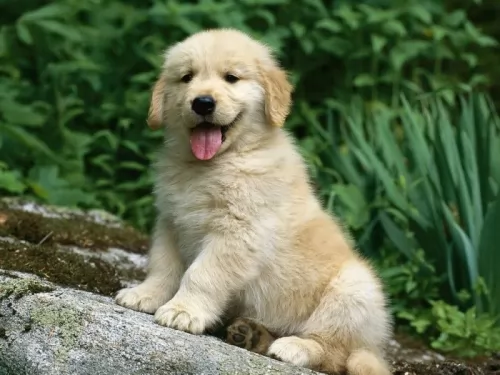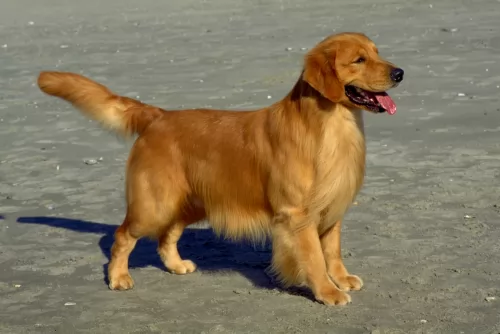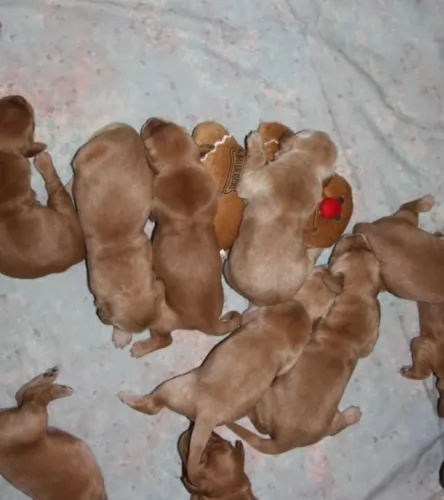 Petzlover
Petzlover Both Golden Retriever and Otterhound are originated from United Kingdom. Golden Retriever may grow 9 cm / 3 inches shorter than Otterhound. Golden Retriever may weigh 18 kg / 39 pounds lesser than Otterhound. Both Golden Retriever and Otterhound has almost same life span. Both Golden Retriever and Otterhound has same litter size. Both Golden Retriever and Otterhound requires Moderate Maintenance.
Both Golden Retriever and Otterhound are originated from United Kingdom. Golden Retriever may grow 9 cm / 3 inches shorter than Otterhound. Golden Retriever may weigh 18 kg / 39 pounds lesser than Otterhound. Both Golden Retriever and Otterhound has almost same life span. Both Golden Retriever and Otterhound has same litter size. Both Golden Retriever and Otterhound requires Moderate Maintenance.
 There aren’t many Otterhounds around and this British pure-breed dog is a scenthound and dates far back to the 19th century.
There aren’t many Otterhounds around and this British pure-breed dog is a scenthound and dates far back to the 19th century.
The dog is regarded as a Vulnerable breed by the English Kennel Club. It is believed that these dogs descended from Bloodhounds and that it was developed in England to hunt otters.The dog’s nose is so sensitive that he was well suited to this job. He was appreciated by royalty and had many royal admirers.
The dog was brought to the United States in 1900 and the Otterhound Club of America was founded in 1960 with the Otter Hound being officially recognized by the American Kennel Club in 1991.
 The Golden retriever always gets in the top ten ranking in USA. They are very intelligent and beautiful. Also they are very active and they take more years to mature as they like being silly and playful. Up-to four years they seem to play like a puppy. As the breed is set in for hunting waterfowl and ducks, they need a regular exercise such as walking or running. They love to roam in the yard and run in the beach.
The Golden retriever always gets in the top ten ranking in USA. They are very intelligent and beautiful. Also they are very active and they take more years to mature as they like being silly and playful. Up-to four years they seem to play like a puppy. As the breed is set in for hunting waterfowl and ducks, they need a regular exercise such as walking or running. They love to roam in the yard and run in the beach.
They love to be always with his master and so it will be inside the home. They can be involved in doing regular home activities. Their characteristic is not to be a watchdog, as it barks when a stranger comes and after that they love to make friendship with him. They don't like to spend time alone and hence love to make new friends. When you think of buying a golden retriever puppy you should check whether the breeder is a reputable breeder.They must be well trained for a good result. When bringing it to many different areas they will gain more knowledge and intelligence. The nails can be trimmed at a regular interval which will be good for the foot of your dog.
 The Otterhound has a weather-resistant double coat which is somewhat oily. The coat is available in a number of colors such as wheat, red, grizzle, black, cream and tan with some white markings.
The Otterhound has a weather-resistant double coat which is somewhat oily. The coat is available in a number of colors such as wheat, red, grizzle, black, cream and tan with some white markings.
The double coat is somewhat oily and he has webbed feet, making him particularly suited for his life around water. This large hound stands at between 61 and 70cm and weighs in the region of 35 to 54kg. He has a large head with a nose that can track and scent in mud.
Otterhounds are active dogs, loving nothing more than to be running and playing, and that of course includes swimming. He makes a great sporting companion too and won’t have trouble keeping up with you as you jog or cycle.
These dogs are friendly, social, docile and amicable but they are also strong-willed, stubborn and independent. If you want him to be obedient and well behaved, then he will most certainly require training and socialization.
They get on well with children and will appreciate a firm, consistent, kind owner. He isn’t a city dog as he requires room to run, and therefore a farm or home with large grounds will suit him. Not only that, he is quite a barker, especially when he is bored with nothing to do so city life and living close to neighbors won't do for him . He will suit an active, outdoor family.
 They love so much to play and spend time with children.
They love so much to play and spend time with children.
The Golden retriever has a good energy which helps them to be a great hunting dog.
They have a high sensitivity level and will enjoy moderate weather. They don't like apartment life as they love to roam freely and explore new areas.
They also have a high intelligence and so learns tricks very quickly. They love to hold something in mouth and run.
 Your Otterhound is a big, beautiful dog who is also lovable, making a great pet for an active kind of family. He is friendly, social and playful but he is also independent and likes to have his own space occasionally.
Your Otterhound is a big, beautiful dog who is also lovable, making a great pet for an active kind of family. He is friendly, social and playful but he is also independent and likes to have his own space occasionally.
He is a loyal, fun dog who has a sense of humor, providing quite a bit of entertainment for his owner. He is the kind of dog that is willing to be 100% part of the family and will be thrilled to be counted in on all activities – whether camping, hiking or swimming.
Give him the love he craves and he will make you an awesome 4-legged friend.
 As the golden retriever gains weight very easily, they should not be overfed. They are prone to get cancer, hip dysplasia, heart problems, eye defects and skin allergies.
As the golden retriever gains weight very easily, they should not be overfed. They are prone to get cancer, hip dysplasia, heart problems, eye defects and skin allergies.
The golden retriever sheds hair profusely. The shedding can be reduced by brushing 3 times a week as it will remove the dead hair.Mild shampoo containing omega 3 and omega 6 fatty acids must be used so that it will prevent hair fall and provides healthy skin and fur. The hair can be trimmed but it should not be shaved as the pet will get problems during winter. Adding a drop of olive oil in the dog food will reduce shedding.
 The average lifespan of this dog is between 10 and 13 years, but with good care he can reach 15 years of age.
The average lifespan of this dog is between 10 and 13 years, but with good care he can reach 15 years of age.
The Otterhound is generally a healthy breed but he can sometimes get one or two of the common dog diseases there are.
Common problems that can occur are hip dysplasia. There are things that can be done to prevent this joint condition and one is to ensure your dog doesn’t become overweight. You also want to prevent having your young dog exercise excessively before his first birthday and you don’t want him leaping off beds or other high places.
 The puppy should be fed 3 times a day and it should be morning 7 and noon and evening within 6. They should not be fed after 6pm and should not be given water after 7pm as to make them a perfect watchdog. Peas, potatoes and flaxseed provide nutrition for them. Chicken fat is good for their skin. Chicory root and chelated minerals are good for their health.
The puppy should be fed 3 times a day and it should be morning 7 and noon and evening within 6. They should not be fed after 6pm and should not be given water after 7pm as to make them a perfect watchdog. Peas, potatoes and flaxseed provide nutrition for them. Chicken fat is good for their skin. Chicory root and chelated minerals are good for their health.
The Golden retriever can be fed by normal nutritious and proteins content food as they will gain much energy for them.
As the golden retriever has chances of getting bone problems they should not overfed.
They are having high energy levels and hence they require playing for 2 hours daily. The breed was set in for sporting and hunting and so it likes to play, run and jog.
 Your Otterhound has a curly, longish water resistant double coat which doesn’t shed much. The coat is easy to groom, requiring nothing much more than a brush twice a week.
Your Otterhound has a curly, longish water resistant double coat which doesn’t shed much. The coat is easy to groom, requiring nothing much more than a brush twice a week.
The nails of the dog should be checked regularly and trimmed. Check in and outside his ears as well as his eyes for any sign of infection.
His teeth should also be checked. Some people are reluctant to brush their pet’s teeth, saying this is a new money-making fad and that it has never been required in the past. Whatever your views, periodically check inside your pet’s mouth for the sign of a rotten tooth as this can cause your pet a lot of pain and illness.
The Otterhound has no special food requirements and relies on you to feed him quality, tasty food. For convenience, there are some excellent ready-to-eat, convenient commercially manufactured foods made to cater for your pet’s size and his activity levels.
He also relies on variety in his diet, so give him some home-made food added into the kibble a couple of times a week. Boiled chicken, brown rice or pasta and some cooked vegetables such as carrots, sweet pototoes and spinach will be excellent for him.
He will thank you for keeping things so simple for him as then he won’t be plagued by digestive problems and visits to the vet. You can also add in some raw meat occasionally. Never leave him without fresh, cool water.